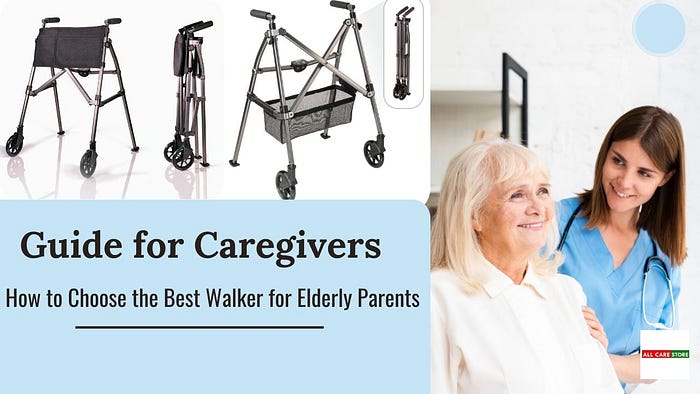Reliable PEG Tube Supplies for Safe Enteral Feeding by All Care Store



If you’re taking care of your aging parents, you have many duties. One of the most important includes safety and mobility. As our loved ones age, it can become difficult to remain independent and move around the house — or outside the home. The right walker can help.
Whether you’re looking for options for your parent’s surgery recovery or helping them balance and maintain their stability, getting the best walker for elderly users takes some consideration.
Here is a useful guide for caregivers in the world of walkers for seniors.
1. Identify Their Mobility Requirements
Walkers are not the same. Some walkers are for limited mobility indoors and others are for active seniors who walk outdoors or need to run errands. First consider your parent’s lifestyle:
· Do they need help only for balance or for full weight-bearing support?
· Are they more independent or heavily reliant on mobility aids?
· Do they live in a compact space or move frequently outdoors?
This will help identify whether an old fashioned walker or a rollator walker is the right option.
2. Decide Between Standard Walkers and Rollators
Typically, walkers fall into two broad categories: standard walkers and rollator walkers.
Standard walkers: Standard walkers have no wheels and maximally sturdy. They are ideal for very short distances & indoor use, primarily for seniors recovering from surgery and those who have real balance difficulties.
Rollator Walkers: Rollator walkers feature four wheels, brakes, and often a seat built in. Rollators work best for more active seniors who want to be confident in their mobility with the flexibility of resting if tired. A rolling walker allows for optimal ease of mobility outside and lessens fatigue when walking.
If your elderly parent is quick to tire, a rollator walker with a seat could relieve the tension of being fatigued without further confusion.
3. Think about Weight Capacity and Build Quality
You should always check the weight capacity of the walker. Most adult walkers have a weight restriction of 250–350 lbs, but there are heavy-duty rollators that offer a higher weight capacity.
You also should look at the build quality. Aluminium frames are preferable because they are light and easy to use, but steel is good as well because of durability. If your parent is going to be using the walker every day, durability should be a priority.
4. Look for Adjustable Handles and Height
Selecting a walker with adjustable handles is crucial for good posture because no two users are the same height. Your parent should be able to walk upright with the perfect walker, which will ease the strain on their shoulders and back.
The majority of senior walkers have height-adjustable settings, usually between 30" and 38". Verify that your parent can hold the handles comfortably without bending over or reaching too far.
5. Consider the Braking System and Wheels
The smoothness of a walker’s movement is influenced by its wheel size. On uneven surfaces, such as sidewalks or outdoor pathways, rollators with larger wheels (6" or 8") are easier to maneuver. Smaller wheels might work well for indoor users.
For rollator walkers, brakes are essential, particularly if your parent uses the walker outside. Seek out dependable and simple-to-use loop-style hand brakes.
6. Remember Foldability and Portability
For both seniors and caregivers, foldable walkers are invaluable. Foldability is essential if you’re assisting your parent with doctor’s appointments or just keeping the walker when not in use.
Many senior walker models are lightweight enough to fit in a car trunk and fold up small. For caregivers who are constantly on the go, this is extremely helpful.
7. Consider Home Safety
The best walker will only be as useful as the environment it is used in. If you are going to use a walker, make sure you remove throw rugs, grab bars near steps/restrooms, and that the walker has enough room to maneuver. Safety at home maximizes the benefits of the right mobility device.
Conclusion
Selecting the right walker for your elderly parent is a combination of comfort, safety, and usability. By considering your loved one’s specific needs, and with the help of this guide, you will be equipped to find the right walker that enhance their mobility and independence.
There are walkers for seniors, walker for elderly, rollator walkers, and rolling walkers that suit every lifestyle. Check out our entire range of walkers for adults, and rollators to help improve safety and comfort in day-to-day activities for the people you care about the most.
Comments
Post a Comment